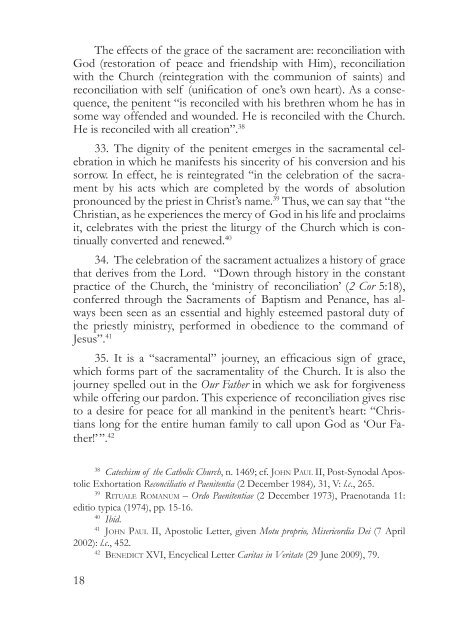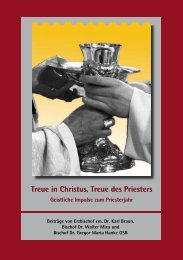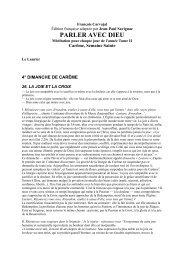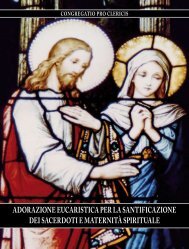the priest, minister of divine mercy - Congregation for the Clergy
the priest, minister of divine mercy - Congregation for the Clergy
the priest, minister of divine mercy - Congregation for the Clergy
You also want an ePaper? Increase the reach of your titles
YUMPU automatically turns print PDFs into web optimized ePapers that Google loves.
The effects <strong>of</strong> <strong>the</strong> grace <strong>of</strong> <strong>the</strong> sacrament are: reconciliation withGod (restoration <strong>of</strong> peace and friendship with Him), reconciliationwith <strong>the</strong> Church (reintegration with <strong>the</strong> communion <strong>of</strong> saints) andreconciliation with self (unification <strong>of</strong> one’s own heart). As a consequence,<strong>the</strong> penitent “is reconciled with his brethren whom he has insome way <strong>of</strong>fended and wounded. He is reconciled with <strong>the</strong> Church.He is reconciled with all creation”. 3833. The dignity <strong>of</strong> <strong>the</strong> penitent emerges in <strong>the</strong> sacramental celebrationin which he manifests his sincerity <strong>of</strong> his conversion and hissorrow. In effect, he is reintegrated “in <strong>the</strong> celebration <strong>of</strong> <strong>the</strong> sacramentby his acts which are completed by <strong>the</strong> words <strong>of</strong> absolutionpronounced by <strong>the</strong> <strong>priest</strong> in Christ’s name. 39 Thus, we can say that “<strong>the</strong>Christian, as he experiences <strong>the</strong> <strong>mercy</strong> <strong>of</strong> God in his life and proclaimsit, celebrates with <strong>the</strong> <strong>priest</strong> <strong>the</strong> liturgy <strong>of</strong> <strong>the</strong> Church which is continuallyconverted and renewed. 4034. The celebration <strong>of</strong> <strong>the</strong> sacrament actualizes a history <strong>of</strong> gracethat derives from <strong>the</strong> Lord. “Down through history in <strong>the</strong> constantpractice <strong>of</strong> <strong>the</strong> Church, <strong>the</strong> ‘ministry <strong>of</strong> reconciliation’ (2 Cor 5:18),conferred through <strong>the</strong> Sacraments <strong>of</strong> Baptism and Penance, has alwaysbeen seen as an essential and highly esteemed pastoral duty <strong>of</strong><strong>the</strong> <strong>priest</strong>ly ministry, per<strong>for</strong>med in obedience to <strong>the</strong> command <strong>of</strong>Jesus”. 4135. It is a “sacramental” journey, an efficacious sign <strong>of</strong> grace,which <strong>for</strong>ms part <strong>of</strong> <strong>the</strong> sacramentality <strong>of</strong> <strong>the</strong> Church. It is also <strong>the</strong>journey spelled out in <strong>the</strong> Our Fa<strong>the</strong>r in which we ask <strong>for</strong> <strong>for</strong>givenesswhile <strong>of</strong>fering our pardon. This experience <strong>of</strong> reconciliation gives riseto a desire <strong>for</strong> peace <strong>for</strong> all mankind in <strong>the</strong> penitent’s heart: “Christianslong <strong>for</strong> <strong>the</strong> entire human family to call upon God as ‘Our Fa<strong>the</strong>r!’”. 4238Catechism <strong>of</strong> <strong>the</strong> Catholic Church, n. 1469; cf. JOHN PAUL II, Post-Synodal ApostolicExhortation Reconciliatio et Paenitentia (2 December 1984), 31, V: l.c., 265.39RITUALE ROMANUM – Ordo Paenitentiae (2 December 1973), Praenotanda 11:editio typica (1974), pp. 15-16.40Ibid.41JOHN PAUL II, Apostolic Letter, given Motu proprio, Misericordia Dei (7 April2002): l.c., 452.42BENEDICT XVI, Encyclical Letter Caritas in Veritate (29 June 2009), 79.18







